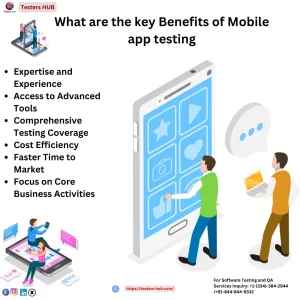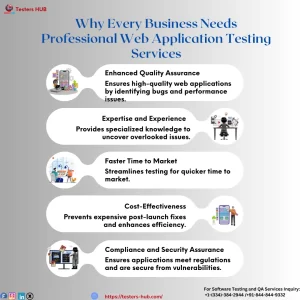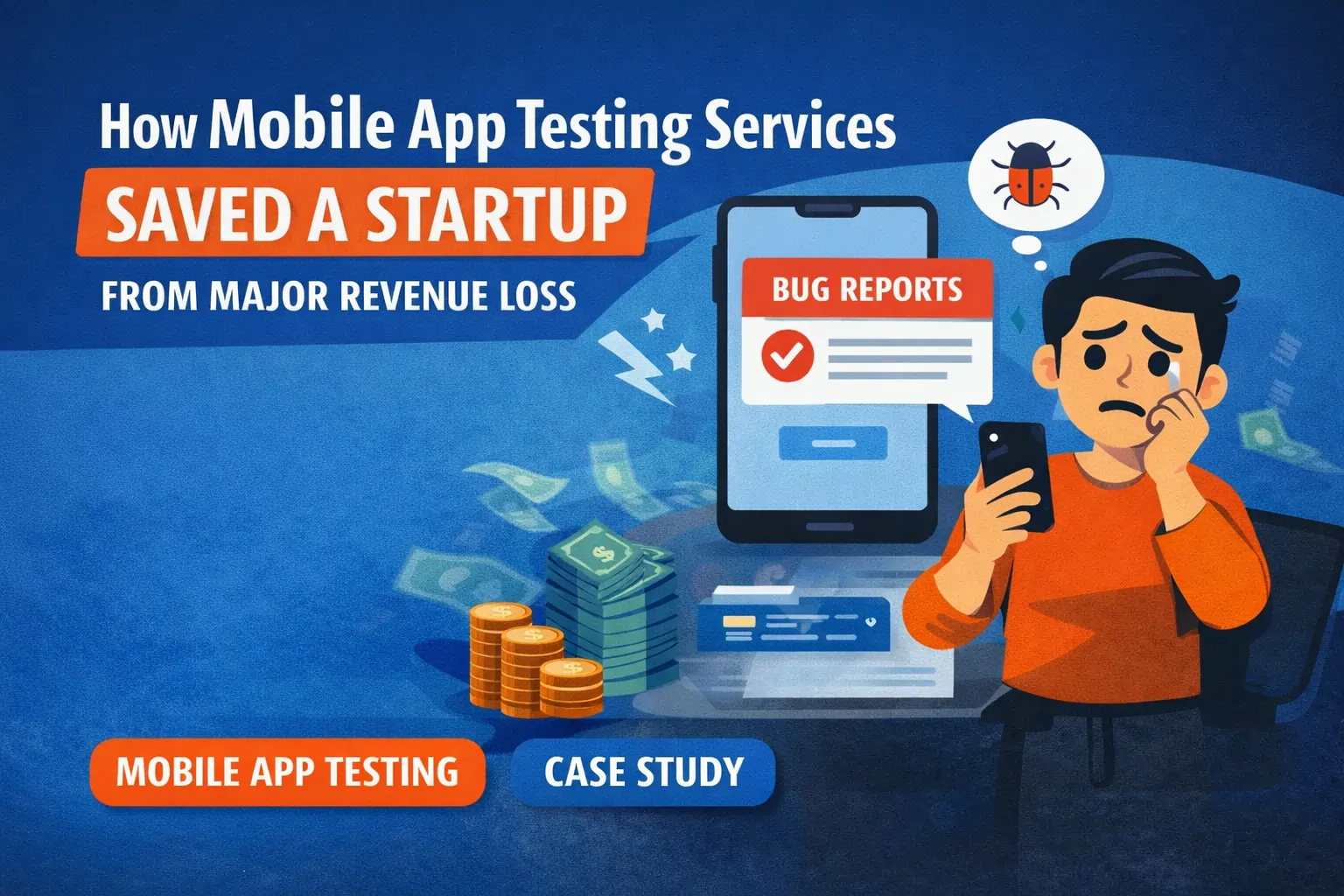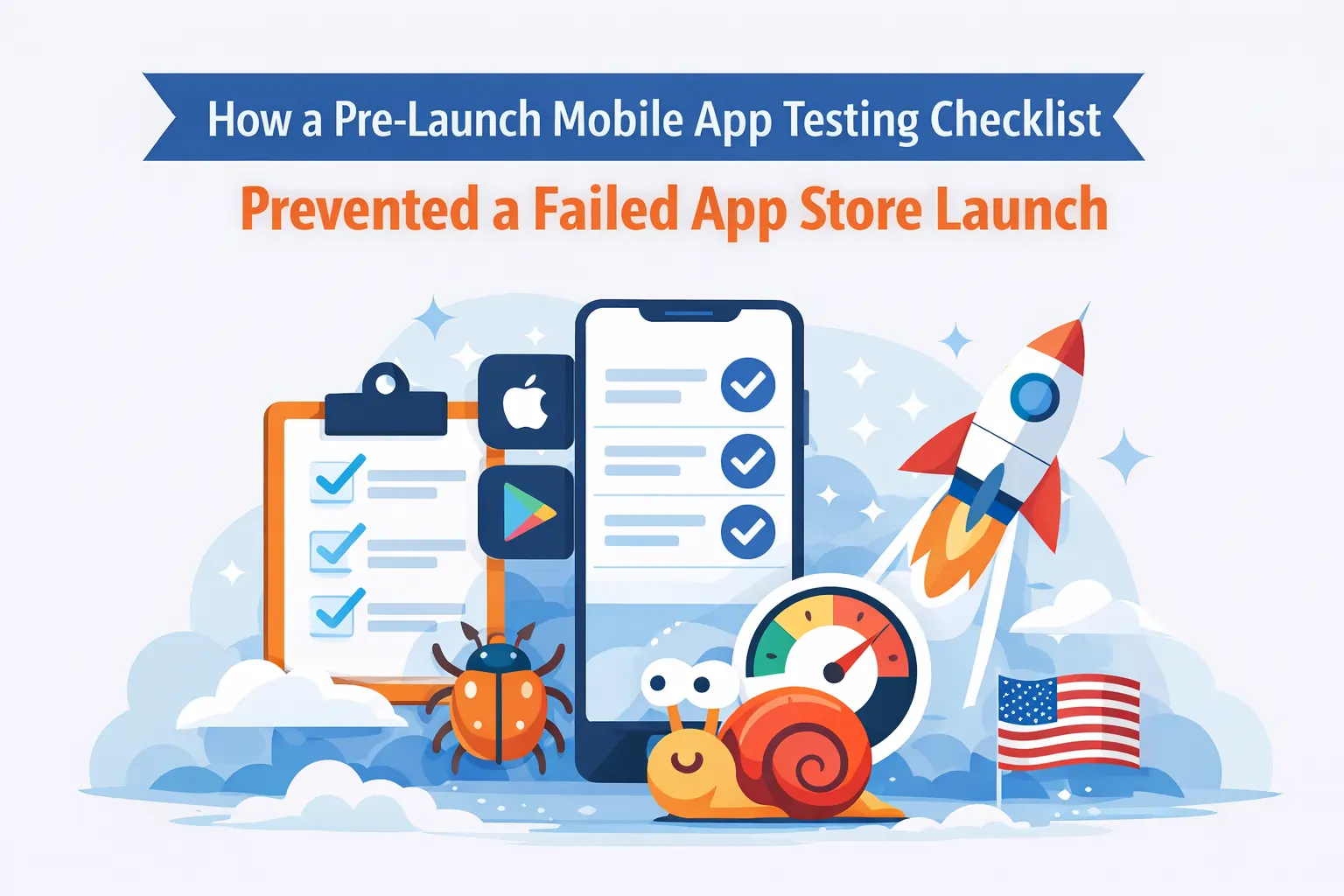Mobile App Testing vs. Web App Testing: What QA Engineers Need to Know
In today’s ever-changing digital world, it’s crucial for businesses to deliver high-quality mobile and web applications to stay competitive. Testing ensures that applications perform efficiently across different devices and platforms. However, mobile app testing and web app testing involve distinct processes, tools, and methods to meet specific user needs. In this blog, we’ll explore the key differences between the two testing types and offer valuable insights for QA engineers.
Mobile App Testing: Key Considerations for QA Engineers
1. Platform Diversity in Mobile Testing
A significant challenge in mobile app testing is the vast array of platforms available. Mobile applications must be rigorously tested on numerous devices, operating systems, screen sizes, and resolutions. This is especially pertinent for Android due to its well-known fragmentation. There are thousands of Android devices, each with different hardware configurations, necessitating extensive testing across various OS versions and models.
Conversely, iPhone testing typically involves fewer device variations because the iOS ecosystem is more consistent. Nevertheless, testing on iOS still requires meticulous attention, as each iOS update can bring unique challenges. QA engineers need to ensure that the application functions reliably on the latest iPhone models as well as older versions. Regardless of the platform, it’s crucial to provide a uniform user experience across all devices.
2. Mobile Automation Testing: Efficiency and Scalability
Manual testing can become time-consuming and inefficient, especially for large-scale applications with frequent updates. This is where mobile automation testing plays a key role. Automation tools such as Appium, Espresso, and XCTest allow testers to automate repetitive tasks, significantly reducing the manual effort required to test an app.
Mobile application automation testing not only saves time but also increases test coverage, ensuring that the app works across various devices, operating systems, and environments. This is particularly important for regression testing and continuous integration, where frequent builds require rapid and comprehensive testing. QA engineers must leverage automation tools effectively to keep up with the fast-paced development cycles in mobile app projects.
3. iPhone Testing and Apple-Specific Requirements
When it comes to iPhone testing for iOS applications, there are specific challenges that QA engineers must navigate. Apple enforces stringent guidelines and requirements that apps must meet to gain approval for the App Store. This necessitates that QA engineers thoroughly verify compliance with these standards, as any failure to adhere could result in the app being rejected. Such setbacks can not only delay the app’s release but also harm the company’s reputation.
In addition, iPhone testing must consider hardware differences, including various screen sizes, camera functionalities, and features like Face ID. Although the iOS ecosystem is generally more consistent than that of Android, it’s essential to ensure that the app operates correctly across all relevant devices, ranging from the iPhone SE to the latest iPhone models. This thorough validation process is critical for delivering a reliable and high-quality user experience.
4. Mobile Application Testing Services: Outsourcing for Expertise
Given the complexity of mobile app testing, many businesses opt for mobile app testing services offered by specialized firms. A mobile app testing company, like Testers Hub, offers comprehensive testing solutions that cover everything from manual testing to mobile application automation testing.
Outsourcing to a mobile application testing company ensures that your app undergoes rigorous testing across a wide range of devices and conditions. These companies bring expertise, advanced tools, and device labs that enable thorough testing, ensuring the app is bug-free, performs well, and provides an excellent user experience.
5. Phone App Testing: Real-World Conditions
A crucial element of phone app testing is verifying that the application performs effectively in real-world situations. Mobile devices are frequently used in diverse environments, such as while commuting, in areas with poor connectivity, or even when in airplane mode. Therefore, phone app testing must encompass these different scenarios to ensure that the application operates correctly regardless of the circumstances.
QA engineers need to evaluate how the app behaves under varying network conditions, including shifts between Wi-Fi, 4G, and 5G networks. Furthermore, critical aspects such as battery usage, GPS accuracy, and the ability to function offline should also be rigorously tested. Addressing these factors is essential to meet user expectations and deliver a seamless experience across different situations.
6. Mobile App Testing Services: Comprehensive Solutions
A reputable mobile app testing company provides end-to-end testing solutions that cover all aspects of mobile app development. Testers Hub is an industry leader in providing mobile application testing services, offering expertise in performance testing, functionality testing, security testing, and more. Partnering with a professional testing company ensures that your app is fully tested before it reaches the market, helping you avoid costly post-release issues.
Web App Testing: Key Considerations for QA Engineers
1. Website Testing Automation: Speed and Efficiency
Just as in mobile app testing, automating website testing is crucial for enhancing efficiency in web development. QA engineers leverage tools like Selenium, Cypress, and TestCafe to automate routine tasks, ensuring consistent testing across various browsers and platforms. This approach to website testing automation becomes especially valuable in settings that implement continuous integration and continuous deployment (CI/CD) practices.
By utilizing website testing software, engineers can streamline processes such as browser compatibility testing, load testing, and regression testing. This automation not only minimizes the potential for human error but also accelerates feedback regarding the performance of the web application. As a result, it becomes an essential element in the web app development lifecycle, helping teams maintain high-quality standards while meeting project timelines.
2. Web Application Testing Services: Professional Expertise
Numerous businesses rely on web application testing services to guarantee the quality and performance of their web applications. These services offer thorough testing solutions that encompass various aspects of web development, including functionality, performance, security, and scalability.
A company specializing in web application testing, such as Testers Hub, provides expert services to ensure that your web app operates smoothly across all platforms. Whether your needs include browser compatibility testing, UX evaluations, or security assessments, professional web app testing services equip you with the necessary expertise and tools to create an exceptional user experience.
3. UX Testing Services: Enhancing User Engagement
The effectiveness of a web application greatly depends on the quality of its user experience (UX). UX testing services are designed to assess how users interact with the app’s interface, navigation, and features, ensuring that the overall experience is smooth and intuitive. Poor UX can result in user dissatisfaction, high bounce rates, and decreased conversion rates, making UX testing essential.
These services involve real users engaging with the application to identify usability issues and areas that need improvement. By analyzing user feedback, businesses can make informed adjustments that improve usability and ensure the app delivers a seamless and satisfying experience tailored to user needs.
4. Website Testing Software: Ensuring Compatibility and Performance
Web apps need to function across a wide range of browsers, operating systems, and devices, making website testing software a critical part of the testing process. QA engineers use tools like Browser Stack, Sauce Labs, and Cross Browser Testing to ensure that web apps are compatible across different browsers (Chrome, Firefox, Safari, Edge) and devices.
This type of website testing focuses on ensuring the app’s responsiveness and performance across various screen sizes and resolutions, as well as making sure the web app works well on both desktop and mobile devices. Website testing automation can further streamline this process, allowing engineers to test the app in different environments more efficiently.
5. Usability Testing Companies: Enhancing User Experience Through Professional Testing
Usability is a key factor when developing a web application, and working with professional usability testing companies ensures your app is built with the user in mind. These companies specialize in uncovering usability issues and offering actionable recommendations to improve the overall user experience.
Testers Hub provides extensive usability testing services, assisting businesses in creating web apps that are simple to use, navigate, and engage with. Whether you need support with functionality testing, UX evaluations, or real-world user feedback, expert usability testing companies like Testers Hub offer the knowledge and tools necessary to deliver a seamless and satisfying experience.
Conclusion
Both mobile app testing and web app testing come with their own distinct challenges, requiring QA engineers to approach them differently. Mobile app testing often deals with diverse devices, varying network conditions, and real-world scenarios, while web app testing emphasizes browser compatibility, user interface optimization, and server stability. QA teams must develop targeted strategies for each platform, utilizing specific automation tools to ensure comprehensive and effective testing.
Partnering with a specialized testing company can significantly boost the performance and reliability of your applications. Testers Hub, a leader in both mobile and web app testing, provides full-spectrum testing services that help businesses deliver seamless, high-quality digital experiences. Whether you need mobile app testing or web application testing, Testers Hub offers the expertise, tools, and resources to ensure your applications perform smoothly across all platforms and devices.












